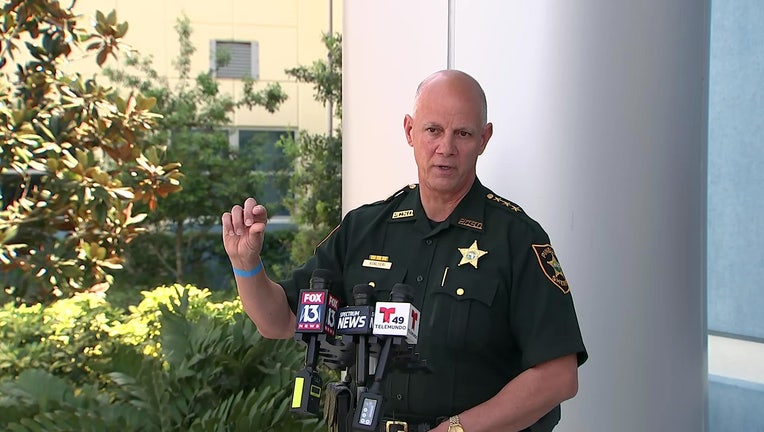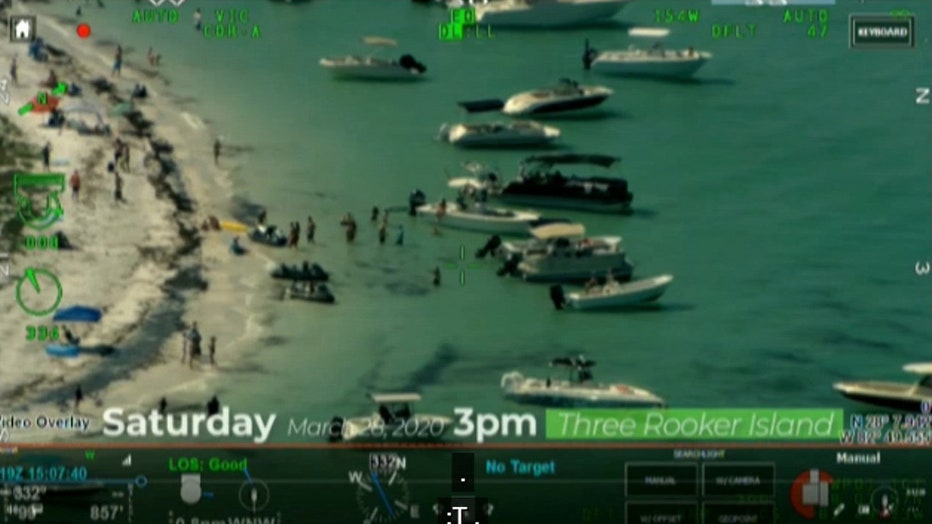Pinellas clarifies 'stay-at-home' rules; lists businesses that should close

LARGO, Fla. - The sheriff of Pinellas County and Pinellas County Commissioner Pat Gerard cleared up some confusion surrounding Florida's stay-at-home order, a day after commissioners and other county leaders tried to understand the governor's seemingly contadictory directives.
During Friday's press conference, Sheriff Bob Gualtieri said under the governor's order, people can leave home for two reasons: essential services and activities. However, in Pinellas County, they took it a step further and chose to shut down non-essential businesses to simplify the order.
"If it is not an essential service and it is a business that does not engage in what's defined as an essential service, we also have shut down that business," Gualtieri said. "The governor's order focuses on people. The governor's order doesn't shut down any business. It makes it cleaner for everybody to understand what they should do."
"The governor sets the floor, not the ceiling, on what local officials can do," he added.
RELATED: Coronavirus stay-at-home order: What is an essential business or activity in Florida?
As of Friday morning, Pinellas County was nearing 300 confirmed COVID-19 cases.
Commissioner Gerard noted that Pinellas beaches and parking lots will remain closed at least until April 10.
Both Gualtieri and Gerard reiterated that marinas and boat ramps in Pinellas County will remain open. Boating is allowed under the 'stay-at-home' order as long as the boats are 50 feet apart and there are no more than 10 people on a boat.
Gerard added that while the county encourages religious institutions to hold online services, they are allowed to be open as long as they follow social distancing guidelines, which means there can be no more than 10 people inside the building and everyone must stay six feet apart.
Sheriff Gualtieri said residents can call 727-582-8477 if they have questions about the order and if they want to report a business that is not in compliance with the order. Residents can also email tips to Covidtips-questions@pcsonet.com.
For a week, the sheriff's office received about 460 tips through its violator tip line, which was made available for residents to report any business that was not practicing social distancing. Most of the complaints were recreational, and the most confirmed violations were also from recreational activities. There were even restaurants still offering dine-in options, in violation of the governor's March 20 order, which directed all Florida restaurants to close their dining rooms.
Over the weekend, the sheriff said Gandy Beach was crowded with people not following the CDC guidelines, and he was forced to personally show up Sunday and shut it down himself.
Gualtieri said there is a provision in Florida law that allows any sheriff to shut down any beach or recreational area.
"We're not reopening it. I got three deputies out there all the time. It was a disaster out there," he said. "There was beer cans flying everywhere. People were partying. People were not adhering to this, they were all over each other. We tried and this is an example. The rules are in place. The guidelines are in place."

Aerial footage from the Pinellas County Sheriff's Office shows several boats at Three Rooker Island on Saturday, March 28.
There were 13 pools that violated the county order passed last week. Under that order, all community pools, except for the ones at a single-family residence, were required to shut down.
The county shared an FAQ page online for the county and state orders.
Here is the list of non-essential businesses ordered to close in Pinellas County:
a. Acupuncture (unless service is under the care of a medical provider)
b. Antique stores
c. Auction houses
d. Automotive tint, wash, detail, and accessory businesses
e. Beauty supply stores
f. Bookstores
g. Clothing and shoe retail, rental, or consignment
h. Craft, art, and hobby supply stores
i. Day/Beauty spas, hair or nail salons, and barber shops
j. Décor and Lighting sales businesses
k. Entertainment establishments
l. Florist businesses
m. Fitness, Dance, Pilates, and Yoga studios and gyms
n. Jewelry stores and jewelry repair businesses
o. Massage (unless service is under the care of a medical provider)
p. Music and instrument stores; music lesson providers
q. Museums
r. Optical retail stores (non-prescription)
s. Painting, craft, or art studios
t. Pet grooming businesses (including mobile and those co-located with pet retail stores)
u. Pet sales and adoptions (excluding on premises animal care)
v. Smoke, tobacco, CBD, or vape stores
w. Spa sales businesses
x. Sporting goods sales and repair businesses
y. Stereo installation and sales businesses
z. Tattoo and piercing services
aa. Toy retail stores, game, or amusement rental businesses
bb. Vitamin stores (unless service is under the care of a medical provider)
Under the state and county orders, essential services include but are not limited to:
a. Banks and financial institutions
b. Community based organizations providing meals and social services
c. Critical trades: (Plumbers, Electricians, Exterminators, Security personnel, etc.) Fire andwater damage restoration, appliance repair personnel, exterminators, and other serviceproviders (such as landscape and pool maintenance service providers) who provide services that are necessary to maintaining the safety, sanitation, and essential operation of residences and other structures
d. First responders, police and fire, jails and prisons
e. Food and beverage (grocery stores, food banks, alcohol sales, restaurants: delivery, take-out or curbside delivery)
f. Funeral services
g. Garbage and Sanitation workers
h. Gas Stations
i. Government operations
j. Hardware, garden and supply stores
k. Hospitals, clinics and other healthcare operations
l. Hotel and lodging
m. Human Service operations
n. Laundromats
o. Post offices and shipping services
p. Transportation: including airports and public transportation such as PSTA
q. Utilities, Public Works and essential infrastructure
Essential activities include, but are not limited to:
a. Attending religious services conducted in churches, synagogues, or houses of worship
b. Caring for or otherwise assisting a loved one or a friend
c. Participating in recreational activities (consistent with social distancing guidelines) such as walking, biking, hiking, fishing, golfing (golf courses may remain open) hunting, or swimming
d. Recreational boating (boat ramps, marinas, and bait/tackle shops may remain open)
e. Taking care of pets

